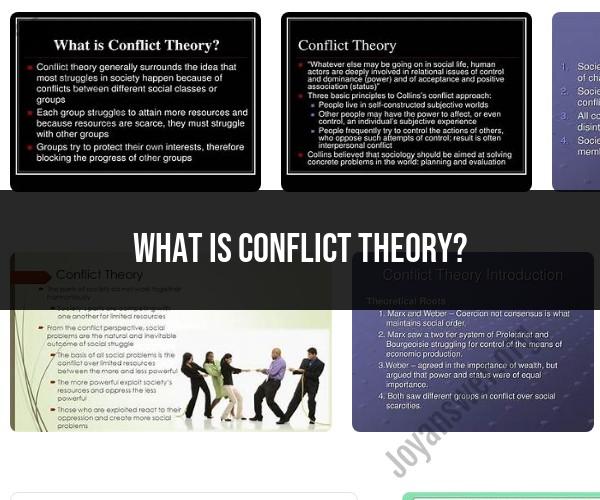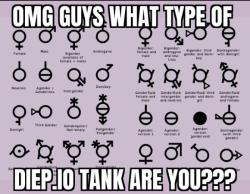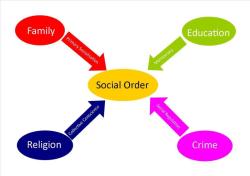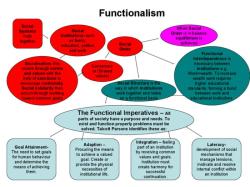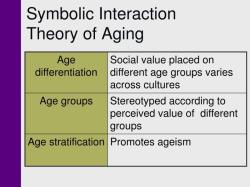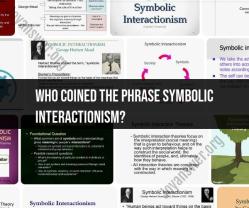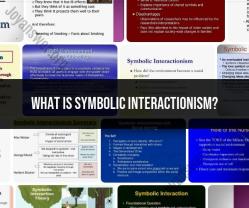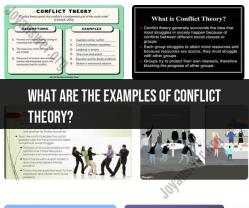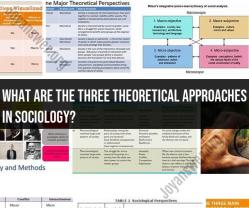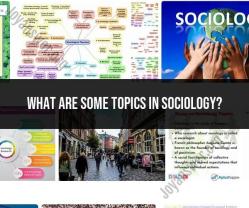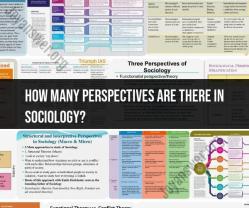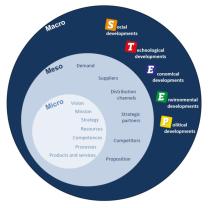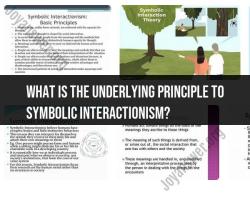What is conflict theory?
Conflict theory is a prominent perspective in the field of sociology that focuses on the role of conflict and competition within society. It is one of the major theoretical frameworks used by sociologists to analyze and understand the structure and dynamics of social systems. Conflict theory views society as a collection of competing groups and interests vying for limited resources and power. This theory emphasizes the following key ideas:
Social Inequality: Conflict theory recognizes that societies are characterized by inherent social inequalities. These inequalities are often based on factors like class, race, gender, and economic status. The theory suggests that these inequalities are not accidental but are deeply ingrained in the structure of society.
Power and Control: Central to conflict theory is the concept of power. It argues that power is not distributed equally in society, and various groups or classes compete for control and influence. Those with more power often use it to maintain their dominance, while those with less power may resist and seek to challenge the status quo.
Conflict and Change: Conflict theory posits that society is in a constant state of change and conflict. These conflicts arise from the competition for resources and the struggle for power. Changes in society are often driven by these conflicts, and they can result in shifts in social, political, and economic structures.
Exploitation and Oppression: Conflict theorists often examine how certain groups, particularly the working class or marginalized communities, are exploited and oppressed by those in power. This analysis encompasses economic exploitation in capitalist systems, as well as social and political forms of oppression.
Institutions and Ideology: Conflict theorists investigate how social institutions, such as the government, education, and media, can perpetuate or challenge power imbalances. They also explore how dominant ideologies and belief systems can be used to maintain the status quo and legitimize the actions of the powerful.
Social Change: Conflict theory sees social change as a product of conflict and struggle. Social movements, protests, and revolutions are often seen as responses to the inequalities and injustices present in society. These movements seek to challenge the existing power structures and bring about change.
Karl Marx, a 19th-century philosopher and economist, laid the foundation for conflict theory, particularly in the context of class struggle within capitalist societies. However, conflict theory has evolved over time and expanded to address issues related to race, gender, and other forms of social inequality.
In summary, conflict theory in sociology provides a critical lens through which sociologists analyze the inherent conflicts and power struggles within society, with a focus on understanding how these dynamics contribute to social change and the perpetuation of social inequalities.
Conflict Theory: Understanding Society's Power Struggles
Conflict theory is a sociological perspective that views society as being characterized by inequality, conflict, and competition for resources. Conflict theorists argue that social order is maintained through the domination of some groups by others, and that social change occurs through the struggles of disadvantaged groups to improve their position.
The Foundation and Core Concepts of Conflict Theory
The foundations of conflict theory can be traced back to the work of Karl Marx, who argued that society is divided into two main classes: the bourgeoisie (the owners of the means of production) and the proletariat (the working class). Marx argued that the bourgeoisie exploits the proletariat in order to maintain its position of power and privilege.
Other core concepts of conflict theory include:
- Power: Conflict theorists argue that power is the key to understanding social inequality and conflict. Power can be defined as the ability to influence the behavior of others, even in the face of their resistance.
- Resources: Conflict theorists argue that social conflict is often rooted in competition for scarce resources, such as wealth, income, status, and power.
- Social change: Conflict theorists argue that social change is driven by the struggles of disadvantaged groups to improve their position in society.
Conflict Theory's View on Social Inequality and Change
Conflict theorists argue that social inequality is a natural and inevitable consequence of the competitive nature of society. They believe that the powerful groups in society will always seek to maintain their dominance, while the disadvantaged groups will always seek to challenge it.
Conflict theorists believe that social change occurs through the struggles of disadvantaged groups to improve their position in society. These struggles can take many forms, such as protests, strikes, and revolutions.
Prominent Figures and Influential Works in Conflict Theory
Some of the most prominent figures in conflict theory include:
- Karl Marx
- Max Weber
- Ralf Dahrendorf
- Lewis Coser
- Randall Collins
Some of the most influential works in conflict theory include:
- The Communist Manifesto by Karl Marx and Friedrich Engels
- Economy and Society by Max Weber
- Class and Conflict in Industrial Society by Ralf Dahrendorf
- The Functions of Social Conflict by Lewis Coser
- Violence: A Sociological Perspective by Randall Collins
Critiques and Counterarguments to Conflict Theory
One of the main criticisms of conflict theory is that it is too pessimistic. Conflict theorists often view society as being inherently conflictual and exploitative, with little hope for social progress.
Another criticism of conflict theory is that it is too simplistic. Conflict theorists often focus on the role of power and resources in social conflict, while neglecting other important factors, such as culture and ideology.
Despite these criticisms, conflict theory remains an important and influential sociological perspective. It provides a valuable framework for understanding social inequality, conflict, and change.
In addition to the critiques mentioned above, some people also argue that conflict theory is too deterministic. They believe that it does not give enough agency to individuals and groups to shape their own destiny.
Others argue that conflict theory is too focused on class conflict and does not adequately account for other forms of social inequality, such as race, gender, and sexuality.
Despite these criticisms, conflict theory remains a valuable and influential sociological perspective. It provides a unique lens through which to understand the social world and the forces that drive it.
